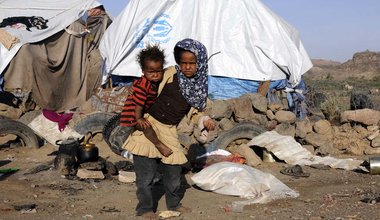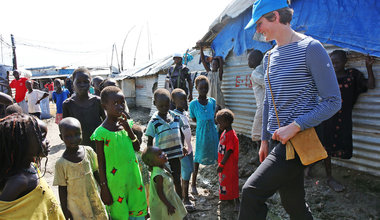UN refugee agency ramps up response as Libya’s humanitarian crisis deepens
 Conflict, insecurity, political instability and a collapsing economy have contributed to the deteriorating humanitarian crisis in Libya, prompting the United Nations refugee agency to announce plans to step-up its presence and programmes there.
Conflict, insecurity, political instability and a collapsing economy have contributed to the deteriorating humanitarian crisis in Libya, prompting the United Nations refugee agency to announce plans to step-up its presence and programmes there.
Amid the increasing complexity of refugee and migrant movements through and from Libya, UN High Commissioner for Refugees Filippo Grandi visited Tripoli yesterday where he met refugees and migrants in some of Libya’s many detention centres.
“I was shocked at the harsh conditions in which refugees and migrants are held, generally due to lack of resources,” Mr. Grandi said. “Children, women and men who have suffered so much already should not have to endure such hardship.”
Some 300,000 Libyans have been displaced by ongoing conflict. In all, more than 1.3 million people – including internally displaced people (IDPs), as well as vulnerable Libyans, host communities, migrants, refugees and asylum-seekers – are in urgent need of humanitarian assistance.
According to Mr. Grandi’s Office (UNHCR), hundreds of thousands of people in the North African country have been affected by the collapse of law and order, absent or insufficient health care assistance, essential medicines, food, safe drinking water, shelter and education. In response, UNHCR is ramping up its existing humanitarian operations and is strengthening cooperation with the International Organization for Migration (IOM) to leverage the respective strengths of both organizations.
“We should not underestimate the challenges of operating in an unstable and volatile environment, such as Libya today,” stressed Mr. Grandi.
In addition to new offices and community development centres for refugees and asylum-seekers, UNHCR is also scaling up its presence in places of disembarkation for people rescued or intercepted at sea, in close cooperation with IOM and other partners.
At the same time, access and humanitarian assistance to vulnerable refugees and asylum-seekers in detention facilities run by the Libyan authorities will be increased, focusing on lifesaving humanitarian activities and advocating for the release of detained refugees and asylum-seekers.
“Our ability to access and effectively deliver much needed protection and assistance is a constant challenge. The people we are trying to help and my staff live and work under enormous strain and risks,” said the High Commissioner.
In the last year and a half, UNHCR has been able to secure the release of more than 800 vulnerable refugees and asylum seekers. The agency is trying to find durable solutions for them.
UNHCR will also boost its programmes to assist Libyan IDPs and host communities who are in dire need of improved access to basic services, which have severely deteriorated as a result of the crisis. Among other activities, small-scale, community-based projects of immediate impact are envisaged for the benefit of host communities, displaced persons, refugees and asylum-seekers.
Libya continues to be the main departing point for refugees and migrants seeking to reach Europe. Mr. Grandi was accompanied to Tripoli by Vincent Cochetel, Special Envoy for the Central Mediterranean Situation, who will be coordinating UNHCR’s cross-regional response to the complexities of mixed migration movements across the Mediterranean, and by Amin Awad, UNHCR’s Regional Director for the Middle East and North Africa.
 UN
UN







